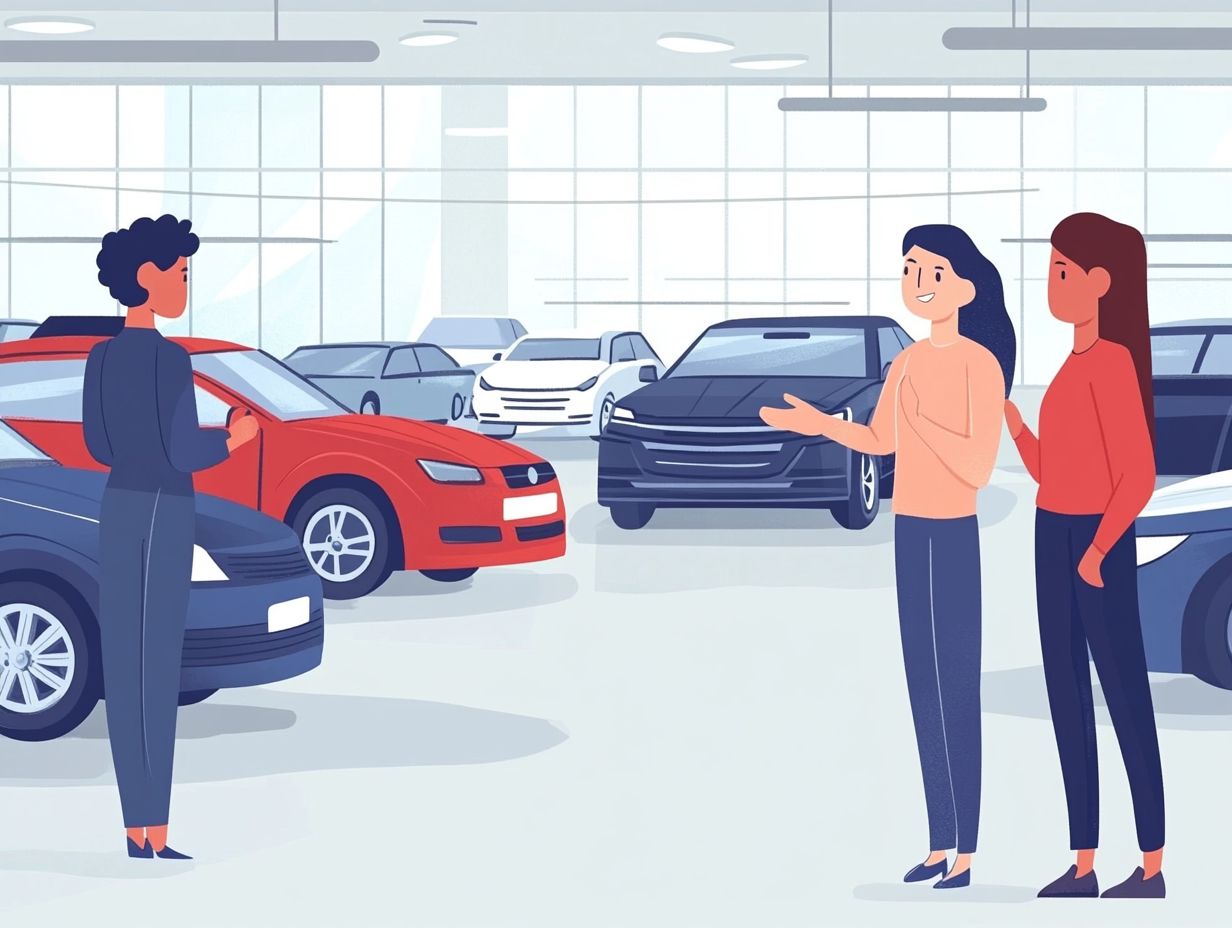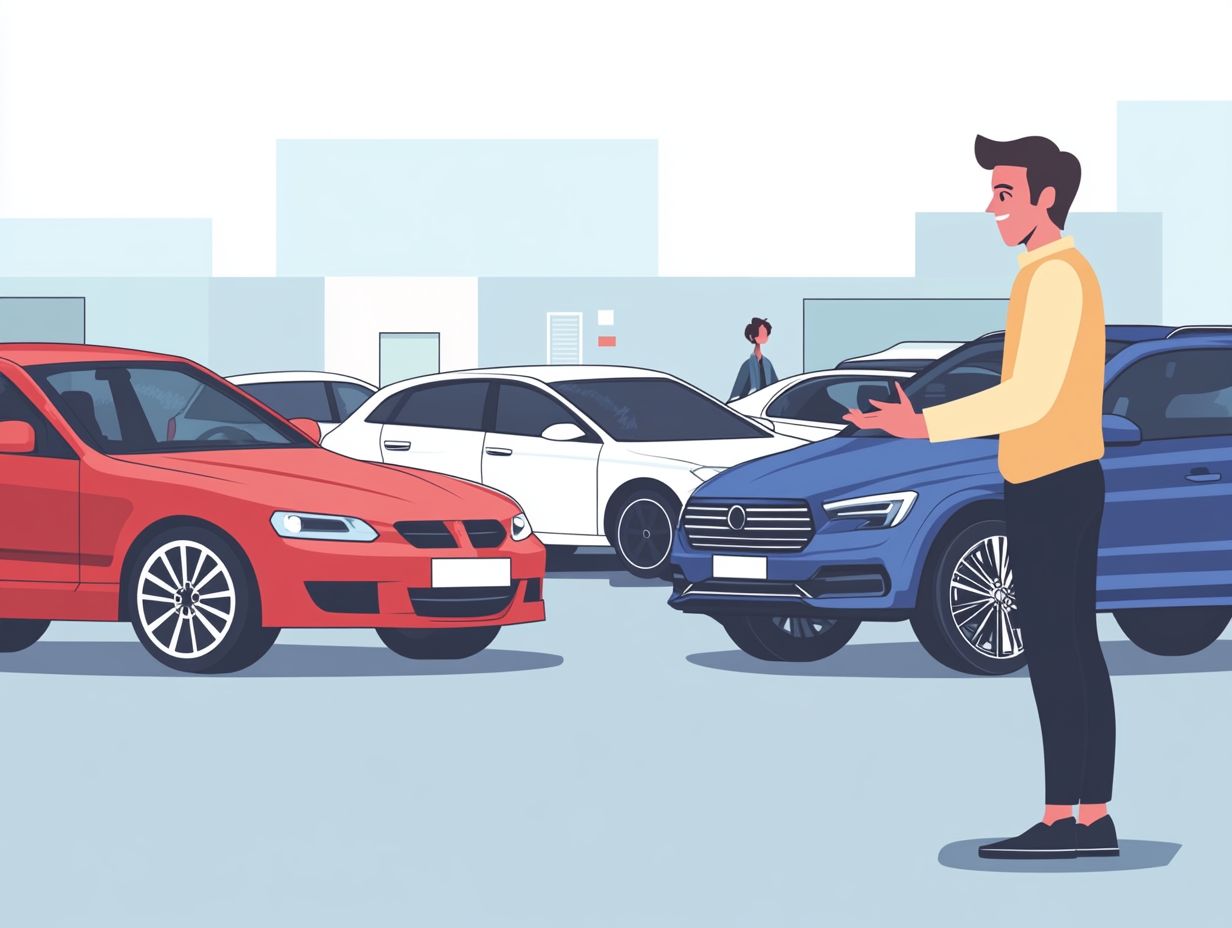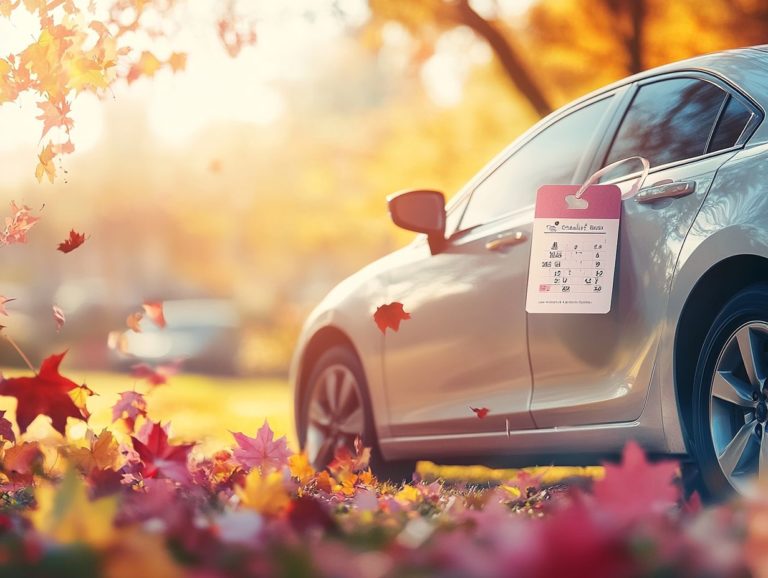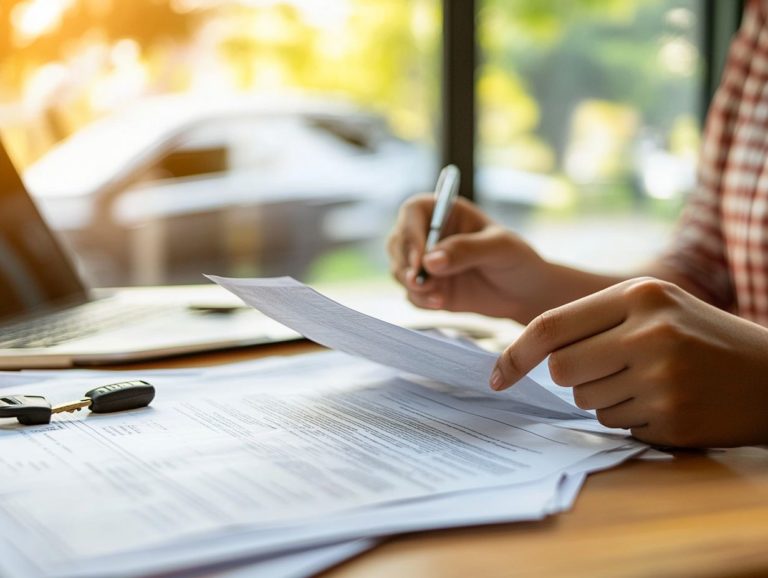Tips for Negotiating in Person When Buying Used
Negotiating in person when purchasing used items can be intimidating, but with the right preparation and strategies, it can transform into a highly rewarding experience.
This guide outlines essential steps to help you navigate the process, from thoroughly researching the item and the seller to establishing a budget that aligns perfectly with your objectives.
Discover effective negotiation techniques, learn how to tackle challenging situations, and gather tips for finalizing deals that leave both you and the seller satisfied.
Get ready to boost your confidence and become a negotiation pro!
Contents
- Key Takeaways:
- Preparing for In-Person Negotiations
- Negotiating Strategies
- Handling Difficult Situations
- Finalizing the Deal
- Frequently Asked Questions
- What are some tips for negotiating in person when buying used?
- Should I make the first offer when negotiating in person?
- Is it okay to negotiate on the price when buying used items?
- How to Negotiate Effectively When Buying Used Items in Person
- Using the Item’s Condition to Negotiate
- Negotiating for Additional Services When Buying Used
Key Takeaways:

- Research the item and seller to understand value.
- Build rapport for a positive negotiation atmosphere.
- Communicate effectively and actively listen.
- Stay calm with difficult sellers.
- Agree on fair prices before finalizing the deal.
Preparing for In-Person Negotiations
Preparing for in-person negotiations when purchasing a used car is essential for achieving an affordable and rewarding experience, and utilizing tips for negotiating with online dealers can enhance your approach.
By gaining a solid grasp of the car market and researching the vehicle s history, you significantly enhance your negotiation power.
Understanding the distinction between retail and wholesale prices is equally important. Establishing clear budget considerations and financial limits in advance allows you to approach the negotiation process with confidence.
Equipping yourself with essential negotiating skills and strategies will enable you to engage effectively with the car salesperson, ultimately leading to a successful outcome.
Researching the Item and Seller
Researching the used car and its seller is your first step toward making a well-informed purchase decision.
Diving into a comprehensive inspection report uncovers the vehicle’s true condition an essential move for steering clear of future maintenance headaches.
Services like CarFax offer a detailed vehicle history that sheds light on any past accidents or repairs, revealing insights that might not be immediately obvious.
Kelley Blue Book, a trusted resource for car values, helps assess the market value, ensuring you secure a fair deal. Understanding the seller’s background can also be pivotal; knowing their history and reputation enhances your negotiating strategy and increases your confidence.
Setting a Budget and Desired Price
Setting a budget and determining your desired price is essential in the car-buying journey, especially when you re looking at used car prices and the potential trade-in value of your current vehicle.
Analyzing different loan rates and their associated monthly payments can significantly influence your overall costs. It s crucial to have a clear understanding of your financial boundaries.
Preparing a realistic budget helps you avoid stretching yourself too thin and ensures that your target price aligns with current market trends.
Researching local car prices and comparing them with your financial capacity not only helps you negotiate better deals but also boosts your confidence in making informed decisions.
Ultimately, knowing your financial limits allows you to explore options that comfortably fit within your means, paving the way for a more sustainable purchase.
Negotiating Strategies
Mastering effective negotiating strategies is essential for anyone aiming to secure the best deal on a used car at a dealership, including knowing what to say when negotiating car prices.
By honing your bargaining skills and adopting a strategic approach, you significantly enhance your chances of success in negotiations.
Familiarizing yourself with the sales tactics employed by car salesmen and understanding your own negotiation power will help you foster a win-win scenario.
Employing various negotiation techniques positions you to adeptly handle counteroffers while cultivating an atmosphere of trust and respect.
Building Rapport and Establishing Common Ground

Building rapport with the car salesman is crucial for successful negotiations. A genuine connection can significantly enhance your experience.
Identify shared interests such as classic cars or favorite sports teams. Use strong communication skills like active listening to gain insights into the seller’s motivations.
Understanding the seller’s perspective helps create a friendly atmosphere. This clarity allows you to express your needs, leading to beneficial outcomes for both sides.
Using Effective Communication and Active Listening
Effective communication and active listening can greatly improve your car-buying experience. Clearly stating your needs helps set a positive tone.
When you express your requirements well, you re likely to receive valuable information. Pay close attention to the seller’s responses to uncover important details.
This approach strengthens your negotiating position and paves the way for a better deal!
Presenting Counteroffers and Negotiating Terms
Presenting counteroffers is key when negotiating for a used car. It allows you to ask for better terms that meet your needs.
Research the car’s market value and your budget. This information helps you craft reasonable and appealing offers.
Use effective negotiation techniques, such as active listening and open-ended questions. These create a collaborative atmosphere and lead to more productive discussions.
Handling Difficult Situations
Facing challenges during car negotiations tests your skills, especially with aggressive sellers.
Dealing with Aggressive or Unreasonable Sellers
Encountering aggressive sellers requires specific techniques and an understanding of your negotiation power. Staying calm and focused on your goals is essential.
Acknowledge the seller’s emotions to foster constructive dialogue. This approach can help diffuse hostility.
Use active listening techniques, like paraphrasing what the seller says, to create validation. Set clear boundaries and communicate your needs assertively.
This combination of composure and strategic communication transforms potential conflicts into opportunities for effective negotiation!
Managing Emotions and Staying Calm

Staying calm during negotiations can turn the tide in your favor!
Managing your emotions and maintaining composure is crucial for a successful outcome when purchasing a used car.
Reaching this level of calm often requires focused effort and emotional smarts to navigate the complex relationships in conversations.
By sharpening your ability to recognize and regulate both your emotions and those of others, you can enter discussions with clarity and confidence.
Employing techniques like deep breathing and active listening sharpens your focus and enables you to respond thoughtfully rather than react impulsively.
This calm approach builds trust, increasing the likelihood of reaching a mutually beneficial agreement and transforming a stressful situation into a positive experience.
Finalizing the Deal
Finalizing the deal is the thrilling climax of your car-buying adventure, demanding your utmost attention as you navigate price agreements and negotiate favorable terms.
Agreeing on a Price and Terms
Agreeing on a price and terms requires mutual understanding between you and the seller, ensuring both parties are satisfied.
This process typically kicks off with a discussion about your budget alongside the seller’s expectations, laying a solid foundation for negotiation.
As the conversation progresses, you might encounter various dealership add-ons, like extended warranties or maintenance packages. Evaluate these options carefully, considering their relevance and potential long-term benefits.
Maintaining clear and open communication is key. It cultivates a trusting atmosphere and allows for any concerns or adjustments to be addressed swiftly.
Reaching a balanced agreement requires patience and a genuine willingness to listen, transforming the process into a collaborative effort aimed at securing a favorable deal for everyone involved.
Completing the Transaction and Ensuring Satisfaction
Completing the transaction marks the final step in your car-buying journey, highlighting the importance of ensuring your satisfaction with the purchase and grasping long-term car maintenance essentials.
During this phase, finalize all paperwork. Take a moment to review contracts and warranties to safeguard your investment.
Selecting the right payment method is equally vital whether you choose financing, leasing, or a cash purchase, making an informed choice can lead to significant future savings.
Once the transaction is complete, strive for a positive post-transaction experience. Don t hesitate to reach out to the dealer with any questions or concerns that may arise.
Establishing a routine for vehicle maintenance and keeping detailed records of services performed can greatly enhance your car’s longevity and performance.
Frequently Asked Questions
What are some tips for negotiating in person when buying used?

When negotiating in person, it’s important to do your research beforehand. Know the market value and gather information about the seller’s asking price. Familiarizing yourself with what to expect in a car negotiation can also boost your confidence. Be prepared to walk away if negotiations are not going in your favor.
Should I make the first offer when negotiating in person?
It’s generally recommended to let the seller make the first offer. This gives you a better idea of how much they are willing to sell for and provides a starting point for your counteroffer.
Is it okay to negotiate on the price when buying used items?
Yes, negotiating on the price when buying used items is expected and often encouraged. Most sellers anticipate some back-and-forth negotiation, so don’t hesitate to make a lower offer.
In conclusion, remember to apply what you ve learned during your negotiation process to secure the best deal possible. Enjoy your new car purchase!
How to Negotiate Effectively When Buying Used Items in Person
Be confident and respectful. Clearly state your offer, but listen to the seller’s counteroffer. A friendly attitude can make negotiations smoother.
Using the Item’s Condition to Negotiate
If you spot flaws or damage, mention them during negotiations. Pointing out imperfections can help you ask for a lower price, but always remain respectful.
Negotiating for Additional Services When Buying Used
Yes, you can negotiate for extras. If buying a used car, for instance, ask for a free oil change or new tires. Always approach these requests politely.






